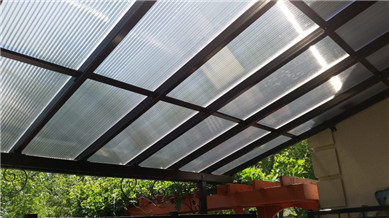Views: 370 Author: Site Editor Publish Time: 2021-07-01 Origin: Site

Most hot spring hotels are located in the suburbs far away from the city. Quiet places allow people to forget the hustle and bustle of the city and enjoy bath wholeheartedly. Many advanced hot spring baths are set outside, so that people can better feel the nature. Open-air hot springs, however, are subject to changes in the weather, and adding a roof may be the best way to avoid exposure to the sun or heavy rain. What kind of material is the most suitable? Definitely PC hollow sheet. Here is why.
Product Features
First of all, as the top cover of the open-air hot spring bathroom, sufficient light transmission must be ensured, so as to provide enough and pleasant light for tourists. PC hollow sheet has the characteristics of high light transmittance, which can be adjusted within 0-82% by changing the color of the sheet. This feature allows the hotel to choose PC sheet with different light transmittance according to the local climate so as to avoid excessive sun exposure while ensuring enough sunlight. Secondly, compared with glass, the heat transfer coefficient (K value) of the PC solar panel's thermal insulation is lower, which helps to improve the comfort of the hot spring bath.
In addition, the PC hollow panel has the characteristics of light weight, which is only 1/2 that of glass of the same thickness. Moreover PC multi-layer board can be bent into the shape required, facilitating handling, installation and shape design. If necessary, the PC sun panel can also be designed as a sliding roof.
In tourist destinations, safety is extremely important. The tough PC hollow board has the impact strength 250 times that of glass, 30 times that of plexiglass, and 2-20 times that of tempered glass. Its wind pressure resistance reaches the first level of the national standard GB/T 7106-2008 and will not break like glass and cause damage to tourist. These features allow the PC panel to better protect tourists.
In addition, PC panels have good fire resistance. The burning point of PC panels of GB8624-2012 flame-retardant B1 grade is as high as 630℃. Even if it burns, it will self-extinguish.
To withstand wind, rain, sun and snow, durability is also important. The weather resistance of the PC multi-layer board is quite good. The long-term use temperature range is minus 40°C to 120°C. In addition, the surface of the product contains an anti-ultraviolet coating, which has good outdoor weather resistance and can withstand harsh weather conditions.
Anti-fogging refers to the formation of a super-hydrophilic coating on the surface of the sheet by changing the surface tension. The contact angle of water droplets is less than 10 degrees, it is a super-hydrophilic coating. When water falls on the super-hydrophilic coating, a thin water film will form. On a vertical surface or a surface with a certain angle, the super-hydrophilic coating flows down under the action of gravity, which can avoid the formation of water droplets, so as to prevent water droplets from dripping on tourists and affecting the play experience. Saining has mastered this technique.
Saining uses fully imported equipment and raw materials for production.
Saining panels have a light transmittance of up to 90+%, heat resistance as high as 148 ℃. At the same time, in order to further improve the durability of the PC solar panel, we have added a 50-micron anti-ultraviolet coating on both sides of the panel for weather resistance and stability. Contact us if you are interested in our products.